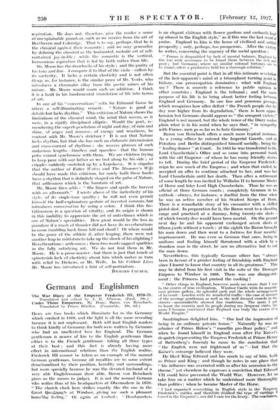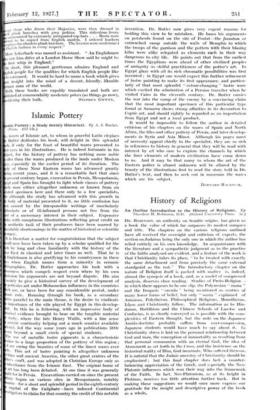Germans and Englishmen
lima: are two books which illuminate for us the Germany which crashed in 1918, and the light is all the more revealing
because it is not unpleasant. Both will lead English readers to think kindly of Germany, for both were written by Germans who had an unaffected love for England. The German gentleman is nearer of kin to the English gentleman than either is to the French gentleman--taking all three types at their best ; and this fact is already having more effect in international relations than the English realize. Frederick III cannot be taken as an example of the normal
German gentleman,- because all royalties are to some extent denationalized by their position, heredity and surroundings, but more specially because he was the devoted husband of a very able Englishwoman (how able, Baron von Reischach gives us the means to judge). It is not the normal German who writes thus of his headquarters at Obermodern in 1$70. " The church clock here strikes exactly like the one in the Great Quudrangle at Windsor, giving me such a pleasant
homelike feeling." Or again at Corbeil " Headquarters is an elegant chateau with flower gardens and orchards kept up almost in the English style," as if this was the last word of praise. England to him is the home of civilized and settled prosperity ; only, perhaps, too prosperous. After the victory he writes, concerning the urgency of the social question :
" France is disqualified by lack of mental balance, England by the too wide severance to be found there between the rich and poor ; but Germany, where no similar colossal fortunes are to be found, offers a productive field for a thorough solution."
But the essential point is that in all this intimate revelation of the heir-apparent's mind at a triumphant turning point in history, one preoccupation dominates : what will England say ? There is scarcely a reference to public opinion in other countries ; England is the tribunal ; and the main purpose of his life is to bring about better feeling between England and Germany. In one fine and generous passage, which recognizes how after defeat " the French people day by day rose higher from its degradation," there is keen appre. hension lest Germans should appear as " the arrogant victors." England is not named, but the whole tenor of the Diary makes plain what is in his mind when he says that, " in sympathy with France, men go so far as to hate Germany."
Baron von Reischach offers a much more typical instance. As a young officer he entered the Imperial Guards, and at Potsdam and Berlin distinguished himself socially, being the " leading dancer 7 at Court. In 1885 he was transferred to the Lord Chamberlain's Office and so came into personal touch with the old Emperor—of whom he has many friendly stories to tell. During the brief period of the Emperor Fredericks reign he saw much of the Empress ; and when that ended, he accepted an offer to continue attached to her, and was her Lord Chamberlain until her death. Then after a retirement of some length he was invited by Wilhelm II to become Master of Horse and later Lord High Chamberlain. Thus he was an official at three German courts ; completely. German in his outlook—always, for instance, a duellist from the time when he was an active member of his. Student Korps at Bonn. There is a remarkable story of his encounter with a skilled pistol shot. In preparation for it, the Baron went to a shooting range and practised at a dummy, firing twenty-six shots— of which twenty-five would have been mortal. On the ground next day he and his opponent exchanged seven shots at fifteen yards without a touch ; at the eighth the Baron brought his man down and then went to a fortress for four months' imprisonment. He was even so German that once, being in uniform and finding himself threatened with a stick by a drunken man in the street, he saw no alternative but to cut the man down.
Nevertheless, this typically German officer has " always been in favour of a greater feeling of friendship with England since I learnt to know that country in all its greatness." This may be dated from his first visit in the suite of the Dowager Empress to Windsor in 1888. There was one disappoint- ment ; the Princess had praised the cooking !
" Other things in England, however, made me. aware that I was in the centre of true civilization. Windsor Castle with its magnifi• cent picture gallery, its splendid park and the whole arrangement of its court—London with its wonderful traffiethe ease of manner of the average gentleman as well as the well dressed crowds in the streets—unmistakably showed fine traditions. The more I got to know the country and its people during my frequent visits, the more I became convinced that England was truly the centre of a World Empire."
Sandringham delighted him. " One had the impression of being in an ordinary private house." NaturallY he was no Admirer of Prince Billow's " maudlin pm-Boer policy," and when he found himself in England soon after he Kiiiser's despatch (tepresenting-the Empreis Frederick at Prince Henry of Battenberg's funeral) he came to the conelusiori that " the English were not frightened of us "—but: that the Kaiser's entourage believed they were.
' He liked. King Edward and has much to say of hind, both as Prince and King ;- and though he notes in one place that his influence was overrated with us after his aeces.sion to the throne," yet elsewhere he expresses a conviction that Edward VII could hive prevented the World War: However, let us take him on a matter which he understood more thoroughly than politics ;- when he became Master of the HOrse, - I had organised everything in English style in the Empress Frederick's stables and -thercfere disliked the type of 'Carriage I found in the Emperor's, nor did I care for the livery. The coachmen. ept those who drove their Majesties, were then dressed in k plush breeches with grey jerkins. This ridiculous livery surmounted by extremely antiquated top-hats . . . Boots were red to be copied from English models. I ordered leathers replace the obsolete plush knickers. The liveries were modernised English fashion in every respect."
Herr Ackerbach was named as assistant. " An Englishman o saw him drive at a London Horse Show said he might be first whip in England."
In short, this pleasant gentleman admires England and dish people for the qualities for which English people like be esteemed. It would be hard to name a book which gives re insight into the mind of a decent, friendly, likeable man man of the world.
Both these books are capably translated and both are blished at commendably moderate prices (as things go now),











































 Previous page
Previous page